Home > About Us > Sustainability Management > Sustainability Report > Sustainability Report 2013 > Message from the President
 Message from the President
Message from the President
Environmental and Social Contributions are the Strength Behind the Kobe Steel Group's Future Growth.
What is the Kobe Steel Group's future approach to environmental and social contributions? President Hiroya Kawasaki, newly appointed in April 2013 and serving as Chairman of the Environmental Management Committee, discusses future measures for the Group.
We will carve a new vision based on action.
![]()
Since its founding, the Kobe Steel Group has pursued manufacturing in a variety of fields, helping to reduce environmental impact and support industry and society. Environmental and social contributions are fundamental to the operations of the Group.
With implementation of our medium- to long-term business vision, KOBELCO VISION "G," strengthening manufacturing capabilities and contributing to society have become vital pillars of the Kobe Steel Group. I see implementation of this vision as my personal mission, and am working to revolutionize operations so as to contribute further to Group growth and environmental and social contribution.
My daily byword, meanwhile, is "action." Building on our previous president's (current Chairman Hiroshi Sato) dedication to "barrier-free" management, I hope to overcome the walls in our organization to mobilize myself and others and carve out a new future for the Group.
Contributing to the future with "Only One" products, we will strengthen our manufacturing capabilities.
![]()
The Kobe Steel Group focuses on materials businesses such as steel, welding, aluminum, copper and other materials, while machinery businesses include industrial and construction machinery, engineering, and environmental solutions. Our wide variety of businesses includes wholesale power supply, real estate and electronic materials. We refer to our ability to offer products and technologies with original added value in this wide range of fields as KOBELCO's "Only One" advantage.
Among our many offerings are a wealth of products and technologies that help reduce environmental impact, effectively utilize underused energy sources, and address the pressing issues faced by society. We consider contributing to the environment and society to be one of our most important missions.
In order to effectively strengthen our monozukuri-ryoku or manufacturing capabilities, the MONODZUKURI (Production System Innovation) Planning & Promotion Department was established at the Head Office in fiscal 2010. This cross-divisional, Groupwide initiative for sharing cutting-edge information is intended to accelerate the development of new products and manufacturing technologies. These efforts will contribute to the creation of new "Only One" products and technologies.
The development of technologies for environmental conservation will accelerate Groupwide growth.
![]()
The strengthening of monozukuri-ryoku (manufacturing capabilities) is a major pillar of our future environmental management. The development of products with greater added value will allow us to contribute greatly to conservation of the global environment.
For instance, Kobe Steel products such as high-strength steel sheet and aluminum promote the lightweighting of automobiles, contributing to improved fuel consumption and reduced CO2 emissions. The greater use of multi-materials, such as the optimal use of high strength steels and aluminum alloys, can only be expected to grow stronger in this field. Responding to this trend by developing technologies and widening our scope of offerings will in turn lead to new growth for the Group.
Kobe Steel is developing new eco-businesses, with a firm gaze on the future of energy and society.
![]()
Kobe Steel has adopted a strong approach to new energy. Through development of new technologies, such as binary generation systems to make effective use of thermal energy from hot springs, and SteamStar generators, which utilize previously unused steam at small and medium-scale factories, we contribute to energy conservation and reduced CO2 emissions. Additionally, working in conjunction with organizations such as Kobe City and Osaka Gas Co., Ltd., we are carrying out trials into using biogas produced from sewage sludge as municipal gas and automobile fuel. By utilizing our proprietary technologies to make effective use of unutilized energy sources, we are uncovering new and groundbreaking possibilities.
The technology behind hydrogen stations for the supply of fuel-cell vehicles is also on the verge of commercialization. Through comprehensive development of hydrogen generators, high-pressure hydrogen compressors, and other technologies necessary for the realization of hydrogen stations, we aim to establish a foundation for the hydrogen station industry.
To earn the love and support of local communities, we engage in a diverse range of social contributions.
![]()
With bases both in Japan and throughout the world, Kobe Steel believes that social contribution is an integral aspect of the Group's operations. Aiming to win the love and support of local communities, we engage in a wide range of activities, including roadside cleanups, factory trips for local students, and the creation of green tracts of land and biotopes.
For instance, in Yamaguchi Prefecture, Kobe Steel's Chofu Works as well as nearby Group companies care for approximately 200 cherry trees planted along national highways in front of the plants. After many long years of greenification, the trees have become a familiar sight to local residents. We have also begun new initiatives, such as forest development at two locations in Hyogo Prefecture and participation in environmental education outreach programs carried out by Kobe City at local children's centers. As one new initiative, in fiscal 2013 we implemented the KOBELCO Forest Fairy Tale Prize, helping to nurture children who carry the next generation on their shoulders.
The Kobe Steel Group also focuses on contributing to society through sports. Since 2005, in conjunction with the KOBELCO Cup, a special event to help popularize rugby, we have also held boys' rugby camps open to high school students from across the country. In 2012 the camps were also opened to girls. With seven-member rugby as an official event at the 2016 Rio de Janeiro Olympics, we hope to cultivate as many students as possible with the possibility of playing in the Olympic games.
Additionally, in order to contribute to the physical education of children, SCIX, an NPO supported by Kobe Steel, invites children to local sports grounds to participate in an original sport known as "Spaceball."
In the future, we plan to continue contributing to local communities through activities such as these.
Compliance relies on the eyes and ears of each employee.
![]()
Safety and compliance are at the root of all of the Kobe Steel Group's operations. For the Group, compliance goes a step beyond legal and regulatory requirements. For instance, even when permitted by law, the Group does not engage in any actions which would be problematic for local residents or customers. We consider this approach to be good common sense, and entrust all our employees with policing their work and surroundings. Compliance requires the eyes and ears of each and every employee.
One of my personal hobbies is to cultivate roses, but to ensure beautiful roses requires diligent care. However, it is precisely because of this toil that the roses which bloom are so exceptional. Likewise, as we look to the future, I hope to make use of our strengths and resourcefulness to ensure that the Kobe Steel Group's environmental and social contributions continue to thrive and blossom.
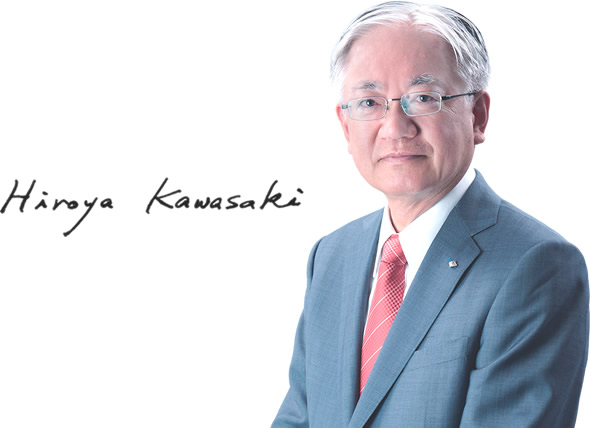
Hiroya Kawasaki
President , CEO and Representative Director
Kobe Steel, Ltd
KOBELCO VISION “G”
Aiming for the Creation of New Value and Global Growth
![]()
Basic Policy
![]()
Expanding into Global Growth Markets with Kobe Steel Group “Only One” Technologies, Products and Services
Main policies
- Thorough pursuit of high-end “Only One” products
- Further improvement of manufacturing strengths
- Growth and business expansion
- Demonstrating the comprehensive capabilities of the Group
- Contributions to society
Barrier Free
![]()
“Barrier free” is a key concept in our Group management for galvanizing the entire Kobe Steel Group by improving links between our diverse businesses. Removing barriers between organizations and departments creates synergy in technology and knowledge, and it is when individual employees overcome barriers and push to improve themselves that the barriers between customers and the Group are finally surmounted. One outgrowth of this concept was the MONODZUKURI (Production System Innovation) Planning & Promotion Department, which works to improve manufacturing capabilities through horizontal interaction among our business units.
Activities Undertaken by the MONODZUKURI (Production System Innovation) Planning & Promotion Department
![]()
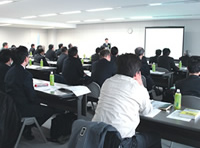
The MONODZUKURI (Production System Innovation) Planning & Promotion Department works to unite the diverse knowledge and skills of the Group, surpassing the manufacturing capabilities of individual business segments and Group companies, by sharing cutting-edge initiatives and know-how and promoting exchanges between manufacturing bases. As part of these efforts, leaders’ meetings for monozukuri promotion and Manufacturing Technology Exchange Meetings are held regularly at our manufacturing locations.
Lightweighting of Automobiles
![]()
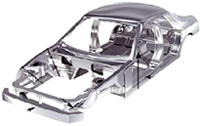
By offering high strength steel sheet, aluminum alloys, and dissimilar metal joining technologies, Kobe Steel aims to realize stronger, lighter-weight automobile parts, thus contributing to improved fuel consumption. This technology is put to use in a wide variety of parts, including panel materials such as for hoods and doors, extrusions such as for bumpers, and forgings for suspensions.
Binary Power Generation
![]()
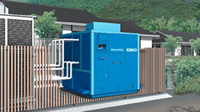
A binary generator is a power generation system that vaporizes a working medium with a low boiling point using hot water (70-95°C), and then uses the steam thus generated to rotate a turbine. In addition to hot springs, these generators can be used to generate electricity from the thermal effluent and steam produced by factories. Binary power generators have already been installed at private power plants in Unzen in Nagasaki Prefecture and Beppu in Oita Prefecture.
SteamStar®
![]()

By utilizing the steam produced by small boilers at small and medium-scale manufacturing facilities, highly efficient electricity generation can be made possible. There are approximately 250,000 small boilers in operation in Japan. If just 5% of those were installed with SteamStar®, it is estimated that CO2 emissions could be reduced by approximately 5 million tons per year.
Forest Development
![]()
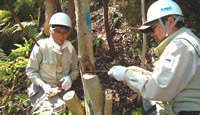
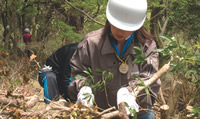
As part of environmental efforts that involve all employees, forest development was initiated in 2011. Kobe Steel cares for two forest areas, including a countryside forest known as KOBELCO Green Forest in Greenpia Miki, and a portion of the Rokko mountain range known as ECOWAY Green Forest. A total of 600 members participated in forest development in fiscal 2012.
KOBELCO Green Project
The KOBELCO Forest Fairy Tale Prize
![]()
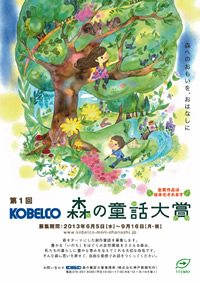
In addition to previous forest development programs, Kobe Steel has implemented the KOBELCO Green Project, which includes the KOBELCO Forest Fairy Tale Prize, a program to contribute to the environmental education of children. Open to elementary, middle and high school students, the KOBELCO Forest Fairy Tale Prize is a contest calling for fairy tales on the theme of forests and nature. First prize stories will be turned into picture books by professional authors and illustrators, and used in future environmental education.
Spaceball
![]()
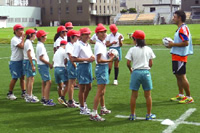
Modeled after one of the practice drills used by the Kobe Steel rugby club, Spaceball is a new and original sport. The sport allows children to have fun learning about the use of “space” common to ball and goal sports such as soccer, rugby and basketball. In addition to physical education and fitness, the sport also cultivates a sense of space, broader vision, communication skills, and situational judgment.


